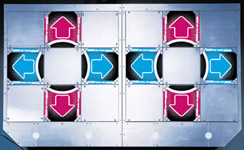Topic: Culture

DDR dance pads.
I first played DDR in arcades in Korea, where I was struck that there were video games to teach you how to dance. Along with the karaoke systems that gave you a score for accuracy (but not interpretive genius), I felt this went a long way toward explaining the quality of Korean pop videos. The way it works is that there are four arrows on the floor pad — up, down, left and right — and corresponding arrows scroll up the screen. When they cross a certain point, you have to step on the pad indicated. Sometimes they come in combos, which involves jumping on two arrows at once.
The game was fun in Korea, but we were never keen to hang out in video arcades. What has turned me into a Dance Dance Revolutionary is my friend Daniel’s purchase of the game for his girlfriend. Our entire circle of friends is now hooked. Daniel and his girlfriend got so gung-ho, in fact, that he actually bought a pair of fancy dance pads so that he and his girlfriend could play simultaneously, in battle mode. On Saturday night, as the blizzard thickened, a whole bunch of us gathered at Daniel’s, and using all three pads, we Danced Danced Revolted the night away, occasionally pausing when our feet were overheated to run barefoot through the snow in Daniel’s yard. (Those of us who were too pooped to keep playing went in the kitchen and discussed Security Council reform, leading one guest to complain of severe cognative dissonance as he walked across the apartment.)
Dance Dance Revolution may be the perfect game for my generation, arriving at the perfect point in our lives. We are now hitting that age where nature, left to its own devices, will make us progressively uglier over time. But if you’re not involved in some kind of challenging organized sport, exercise can be excruciatingly dull. StairMasters and exercise videos are less intellectually challenging than flossing. DDR, on the other hand, is compelling in a soothingly familiar way. The challenges are familiar from other video games, which also require that you coordinate actions according to rhythmic indicators. The main difference is that you operate the controller with your feet, which means you can get a cardiovascular workout while you play. This is more or less perfect. It’s also appealing to both men and women — a rarity in video games, but incredibly helpful for the increasing percentage of folks my age who are in long-term relationships. And unlike Tetris, that other gender-neutral video game hit, DDR encourages multiple players. Even if you only have one dance pad, you’ll want to switch off, just to give yourself a physical break.
Having joined the Revolution at Daniel’s, Jenny was agitating for a Revolution in our own home. Unfortunately, this would have meant buying a whole gaming system, which is more of an investment than we were willing to make. Lucky for us, there is Cyber Groove, a blatant rip-off for the PC. Ours has shipped; I’ll keep you posted on whether it actually works, and how well.

